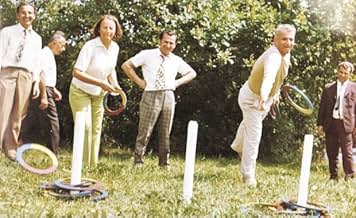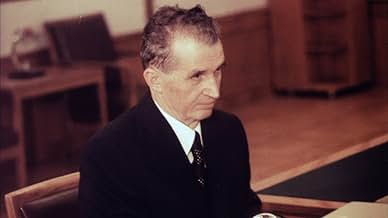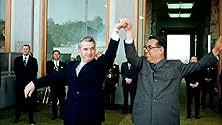IMDb रेटिंग
7.5/10
1.7 हज़ार
आपकी रेटिंग
अपनी भाषा में प्लॉट जोड़ेंThe film explores the image of the Romanian dictator Nicolae Ceausescu using unknown official footage from the Romanian National Television and National Film Archives.The film explores the image of the Romanian dictator Nicolae Ceausescu using unknown official footage from the Romanian National Television and National Film Archives.The film explores the image of the Romanian dictator Nicolae Ceausescu using unknown official footage from the Romanian National Television and National Film Archives.
- पुरस्कार
- 9 जीत और कुल 7 नामांकन
Nicolae Ceausescu
- Self
- (आर्काइव फ़ूटेज)
Elena Ceausescu
- Self
- (आर्काइव फ़ूटेज)
Stefan Andrei
- Self
- (आर्काइव फ़ूटेज)
Gheorghe Apostol
- Self
- (आर्काइव फ़ूटेज)
Iosif Banc
- Self
- (आर्काइव फ़ूटेज)
Eugen Barbu
- Self
- (आर्काइव फ़ूटेज)
Elena Barbulescu
- Self
- (आर्काइव फ़ूटेज)
Lica Barbulescu
- Self
- (आर्काइव फ़ूटेज)
Alexandru Barladeanu
- Self
- (आर्काइव फ़ूटेज)
Ion Birlea
- Self
- (आर्काइव फ़ूटेज)
Emil Bodnaras
- Self
- (आर्काइव फ़ूटेज)
Leonid Brezhnev
- Self
- (आर्काइव फ़ूटेज)
Cornel Bulica
- Self
- (आर्काइव फ़ूटेज)
Ilie Bulucea
- Self
- (आर्काइव फ़ूटेज)
Cornel Burtica
- Self
- (आर्काइव फ़ूटेज)
फ़ीचर्ड समीक्षाएं
Maybe an explanation of the long duration is this: the duration of the movie is part of the message of the movie. I grew up partly during those times in Romania. Having watched this movie now reminds about the dread of many moments that I lived through, especially of the repetitive propaganda that we all had to listen to every day (2 hours of TV program daily, 90% of the time with his face on the screen). The title of the movie – autobiography – suggests that this is how the title character would have made this movie: in the same egotistic way that he ignored the Romanian population during his dictatorship.
Autobiografia lui Nicolae Ceausescu (2010) is a feature-length documentary derived only from archive footage, from images mostly taken by official camera crew of Ceausescu. It covers the years of Ceausescu reign, between 1965 and 1989. From the footage and camera angles we can easily understand that in most of the occasions more than one camera were used for documenting, and that cameramen were given a broad freedom, even shooting the most intimate moments of the Ceausescu couple.
The role of the director here is mainly to edit the images which are mostly arranged in chronological order, but this is where the brilliance of Andrei Ujica starts to shine! He implements wonderful editing skills, often using montage technique to enrich the narrative. Moreover, in most cases shot/reverse shot is brilliantly used as if this is a well-designed fiction.
For me, this phenomenal documentary, among other things, presents two main issues to remember. First, it shows how the life and people of Romania were seen by a president. How a president lives and how he perceives his country visually. This is because the lens of the camera in most cases can be metaphorically leveled with the eye of Ceausescu. That is why the title of the film is so ironic! We all know that the conditions in Romania were not the same with the images documented by Ceausescu cameramen. And second, it sadly presents how this big communist utopia, this all-happy-people real communism slowly vanishes. It is sad because initial happiness of people really looks like was coming from the heart.
In conclusion, this is a must see documentary, a real cinema pleasure, which bears a potential of numerous discussions, not only about Romania or the so-called communist bloc, but also about the nature of governing and making history.
The role of the director here is mainly to edit the images which are mostly arranged in chronological order, but this is where the brilliance of Andrei Ujica starts to shine! He implements wonderful editing skills, often using montage technique to enrich the narrative. Moreover, in most cases shot/reverse shot is brilliantly used as if this is a well-designed fiction.
For me, this phenomenal documentary, among other things, presents two main issues to remember. First, it shows how the life and people of Romania were seen by a president. How a president lives and how he perceives his country visually. This is because the lens of the camera in most cases can be metaphorically leveled with the eye of Ceausescu. That is why the title of the film is so ironic! We all know that the conditions in Romania were not the same with the images documented by Ceausescu cameramen. And second, it sadly presents how this big communist utopia, this all-happy-people real communism slowly vanishes. It is sad because initial happiness of people really looks like was coming from the heart.
In conclusion, this is a must see documentary, a real cinema pleasure, which bears a potential of numerous discussions, not only about Romania or the so-called communist bloc, but also about the nature of governing and making history.
However, unless Ceausescu wrote it himself, that is a biography, not an autobiography. Minor nitpicking aside, this is simply beautiful to watch. The progression of a man to a leader and then to a myth he believed too much in. The rise to power of a murderous regime is very insidious and can happen again.
Having been born at the end of the 80s, my recollection of communist Romania is negligible. So for me, this wealth of archival footage represents less an excursion into dreary eyed nostalgia, but rather a fascinating, vicarious experience. It is unfathomable to think that this is a part of our human heritage, and the film leaves the impression of being a document of society, culture and politics that's out of this world.
This other-worldliness is achieved through the exclusive use of archival footage, to the detriment of any present-day commentary. The biographical tale of Ceausescu leads us through several decades of communist Romania, and is bound by the trial and execution of the former dictator. Surprisingly, although my knowledge of recent Romanian history is fairly limited, there was little actual information in the the events and moments portrayed which I was unfamiliar with. I'm not sure that's a good thing, for such a long runtime - all it says, to me, is that you should probably not watch this documentary if your aim is solely to gain a straightforward understanding of history.
What it does do very well, is synthesize the essence of what the public frame of mind was at the time. It ebbs and flows beautifully, from the fascination of the Western world with Ceausescu after his stance on the invasion of Prague, to his ultimate isolation within the communist block. In this, as well as in much of the propagandistic materials made for public consumption, there is a strong sense of falsehood meshed together with a (willing) naivety of the everyday folk. The film is at its best when it manages to effectively contain these paradoxes of truth, the double-standards of pre-89 communist dogma, and the absurdity of turning a mildly charismatic, semi-literate individual into an egomaniac with absolute power.
In between all these moments, you've got Ceausescu delving into sheer silliness - with the cherry on top being his speech on how Romania will only return to capitalism when "pigs fly", then joking on the advances of genetics only to realize this is not quite the right thing to say and reinforcing the initial statement with raised pitch and ample gesticulation. There are many scenes like this, of various sizes, that shape Ceausescu as a character and the warped world-view provided by public television. At three hours, one could argue the documentary is overlong, as certain elements become repetitive. One can also argue that in their repetitiveness, these elements bear different meanings, according to the wider context of their occurrence, sort of a seasonal aspect of the biographical story.
Whichever way you look at it, there is so much to see and experience in Andrei Ujica's film, that you are guaranteed to not be left indifferent by it.
This other-worldliness is achieved through the exclusive use of archival footage, to the detriment of any present-day commentary. The biographical tale of Ceausescu leads us through several decades of communist Romania, and is bound by the trial and execution of the former dictator. Surprisingly, although my knowledge of recent Romanian history is fairly limited, there was little actual information in the the events and moments portrayed which I was unfamiliar with. I'm not sure that's a good thing, for such a long runtime - all it says, to me, is that you should probably not watch this documentary if your aim is solely to gain a straightforward understanding of history.
What it does do very well, is synthesize the essence of what the public frame of mind was at the time. It ebbs and flows beautifully, from the fascination of the Western world with Ceausescu after his stance on the invasion of Prague, to his ultimate isolation within the communist block. In this, as well as in much of the propagandistic materials made for public consumption, there is a strong sense of falsehood meshed together with a (willing) naivety of the everyday folk. The film is at its best when it manages to effectively contain these paradoxes of truth, the double-standards of pre-89 communist dogma, and the absurdity of turning a mildly charismatic, semi-literate individual into an egomaniac with absolute power.
In between all these moments, you've got Ceausescu delving into sheer silliness - with the cherry on top being his speech on how Romania will only return to capitalism when "pigs fly", then joking on the advances of genetics only to realize this is not quite the right thing to say and reinforcing the initial statement with raised pitch and ample gesticulation. There are many scenes like this, of various sizes, that shape Ceausescu as a character and the warped world-view provided by public television. At three hours, one could argue the documentary is overlong, as certain elements become repetitive. One can also argue that in their repetitiveness, these elements bear different meanings, according to the wider context of their occurrence, sort of a seasonal aspect of the biographical story.
Whichever way you look at it, there is so much to see and experience in Andrei Ujica's film, that you are guaranteed to not be left indifferent by it.
The only movie who is objectiv about the life of the greatest leade in the history of Romania
टॉप पसंद
रेटिंग देने के लिए साइन-इन करें और वैयक्तिकृत सुझावों के लिए वॉचलिस्ट करें
- How long is The Autobiography of Nicolae Ceausescu?Alexa द्वारा संचालित
विवरण
- रिलीज़ की तारीख़
- कंट्री ऑफ़ ओरिजिन
- आधिकारिक साइट
- भाषाएं
- इस रूप में भी जाना जाता है
- The Autobiography of Nicolae Ceausescu
- फ़िल्माने की जगहें
- Bucharest Metro, बुखारेस्ट, रोमानिया(opening 1979)
- उत्पादन कंपनियां
- IMDbPro पर और कंपनी क्रेडिट देखें
बॉक्स ऑफ़िस
- US और कनाडा में सकल
- $34,023
- US और कनाडा में पहले सप्ताह में कुल कमाई
- $4,644
- 11 सित॰ 2011
- दुनिया भर में सकल
- $67,093
- चलने की अवधि
- 3 घं(180 min)
- रंग
- ध्वनि मिश्रण
- पक्ष अनुपात
- 1.85 : 1
इस पेज में योगदान दें
किसी बदलाव का सुझाव दें या अनुपलब्ध कॉन्टेंट जोड़ें








